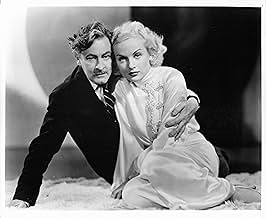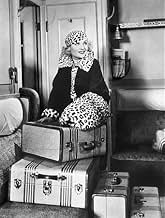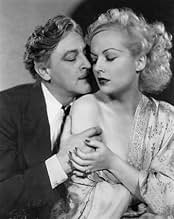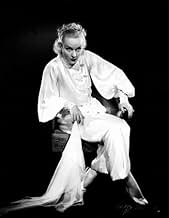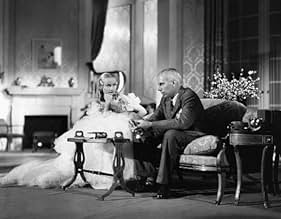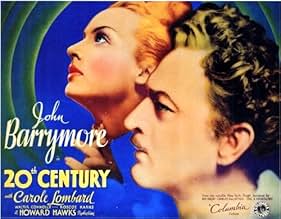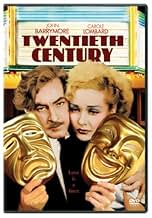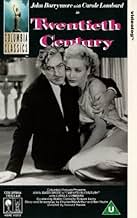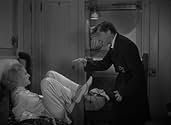AVALIAÇÃO DA IMDb
7,2/10
7,6 mil
SUA AVALIAÇÃO
Um extravagante empresário de Broadway, que passa por tempos difíceis, tenta fazer com que sua antiga amante, agora uma diva de Hollywood, retorne e ressuscite sua carreira em declínio.Um extravagante empresário de Broadway, que passa por tempos difíceis, tenta fazer com que sua antiga amante, agora uma diva de Hollywood, retorne e ressuscite sua carreira em declínio.Um extravagante empresário de Broadway, que passa por tempos difíceis, tenta fazer com que sua antiga amante, agora uma diva de Hollywood, retorne e ressuscite sua carreira em declínio.
- Direção
- Roteiristas
- Artistas
- Prêmios
- 4 vitórias e 1 indicação no total
Charles Lane
- Max Jacobs
- (as Charles Levison)
Bobby Barber
- Sign Painter
- (não creditado)
Herman Bing
- Beard #1
- (não creditado)
Lynton Brent
- Train Secretary
- (não creditado)
Anita Brown
- Black Stage Showgirl
- (não creditado)
James Burke
- Sheriff
- (não creditado)
James P. Burtis
- Train Conductor
- (não creditado)
Eddy Chandler
- Cameraman
- (não creditado)
Nick Copeland
- Treasurer
- (não creditado)
Avaliações em destaque
If "The Lady With Red Hair" (about Mrs. Leslie Carter) gave us a good portrait of theatrical producer/director David Belasco (in the capable hands of Claude Rains), this film shows the ham side. Oscar Jaffe (John Barrymore) is based on Belasco, with his less attractive sides. Here is not the man who simply helped create proper modern stage production and rehearsal technique, but the egotistical side of him (the side Rains showed when he released all contacts to Leslie Carter -Miriam Hopkins in that film - when she dared to marry without his consent). Here Jaffe has created the actress sensation "Lily Garland" from an ambitious shop girl named Mildred Plotka (Carole Lombard). Jaffe has played a caring, fatherly Svengali to her, prodding her by caring, sweet, regretful terms to do what he wants (except they are rehearsing). But although - eventually - Lily is willing to become his lover, he is so jealous that he drives her to flee from him. He decides he can do it again, but falls on his face. She goes on to screen immortality in Hollywood. So he is forced to pull out all stops to get her back to a signed contract, when he learns she and he are traveling back to New York on the Twentieth Century train.
Howard Hawks would tackle farce several times in his career: "His Gal Friday", "I Was A Male War Bride", "Man's Favorite Sport" were all in the future. But this may have been the best of them. The other films have great choice moments, but this one is almost flawless from the start. Take the beginning when Jaffe brings the cast of his first play starring Lili. It is a piece of sentimental pap that Jaffe always produces (later on, before being dismissed by him, Charles Lane tells off Jaffe the truth that he produces hackwork and "gets away with it" because of Lili's talent). In fact, it is a spoof of a popular piece of melodrama from the late 1920s, "Coquette", which was turned into a film in 1929 (and netted Mary Pickford an Oscar, which she should have gotten for other films, such as "Sparrows"). The cast, including an African-American in a typical stereotype servant role of the period, have to go through several hours of rehearsing the first scene due to Mildred/Lily's failure to match Jaffe's exacting direction. What the overly controlling Jaffe does with stage blocking and a piece of chalk is a nightmare for anyone who has ever tried to produce or act in a play. He does, however, know about acting - he reminds Mildred/Lily that when she calls for "Daddy" in an old southern plantation house she is not to use a voice similar to calling "Taxi" in the street.
I won't go into the rest of the film, but wait for "the iron door" whose hinges get dingier and more rusted with each closing, or Barrymore's commentary on "the Passion Play". Lombard has a more subtle, reacting part, but she is Barrymore's equal partner, having the moment of reality at the center of the film: on the train, when after screaming at each other she breaks down and cries, and makes Jaffe realize that they have built themselves into an unhealthy universe where they can't be real people anymore. It's a brief, and touching moment - fortunately not destroying the sheer lovely nuttiness of the rest of the film.
Howard Hawks would tackle farce several times in his career: "His Gal Friday", "I Was A Male War Bride", "Man's Favorite Sport" were all in the future. But this may have been the best of them. The other films have great choice moments, but this one is almost flawless from the start. Take the beginning when Jaffe brings the cast of his first play starring Lili. It is a piece of sentimental pap that Jaffe always produces (later on, before being dismissed by him, Charles Lane tells off Jaffe the truth that he produces hackwork and "gets away with it" because of Lili's talent). In fact, it is a spoof of a popular piece of melodrama from the late 1920s, "Coquette", which was turned into a film in 1929 (and netted Mary Pickford an Oscar, which she should have gotten for other films, such as "Sparrows"). The cast, including an African-American in a typical stereotype servant role of the period, have to go through several hours of rehearsing the first scene due to Mildred/Lily's failure to match Jaffe's exacting direction. What the overly controlling Jaffe does with stage blocking and a piece of chalk is a nightmare for anyone who has ever tried to produce or act in a play. He does, however, know about acting - he reminds Mildred/Lily that when she calls for "Daddy" in an old southern plantation house she is not to use a voice similar to calling "Taxi" in the street.
I won't go into the rest of the film, but wait for "the iron door" whose hinges get dingier and more rusted with each closing, or Barrymore's commentary on "the Passion Play". Lombard has a more subtle, reacting part, but she is Barrymore's equal partner, having the moment of reality at the center of the film: on the train, when after screaming at each other she breaks down and cries, and makes Jaffe realize that they have built themselves into an unhealthy universe where they can't be real people anymore. It's a brief, and touching moment - fortunately not destroying the sheer lovely nuttiness of the rest of the film.
Funny and intelligent comedy features a brilliant performance by Barrymore, spoofing his earlier "Svengali" role. He looks and acts a lot like Peter Sellars would in later similar performances; now morose, then practically jumping with energy. Lombard also turns in a right-on performance.
Here is a film where Hawks really finds his mark, because the comedic action is perfectly timed, flows nicely, and feels natural, and even includes some early Hawks "overlapping dialogue".
Hardly a dull moment, miles above its peers.
Here is a film where Hawks really finds his mark, because the comedic action is perfectly timed, flows nicely, and feels natural, and even includes some early Hawks "overlapping dialogue".
Hardly a dull moment, miles above its peers.
Completely over the top, silly but very funny, Twentieth Century makes the most of Carole Lombard and John Barrymore's comedic talents. This film marked the beginning of Lombard's fabulous career (tragically cut short in 1942) and the end of Barrymore's. They truly are two of the best performers that motion picture history has ever seen. I really envy Lombard's ability to laugh on cue, and Barrymore's ability to pull hilarious facial expressions.
Oscar Jaffe, (John Barrymore), a big time director, made Mildred Plotka now named Lily Garland a star, but HIS career is taking a battering after Lily packed up her life with him and on stage for Hollywood stardom. They accidentally meet on the Twentieth Century Limited and hilarity ensues! There is some fantastic physical comedy here and both Barrymore and Lombard are fantastic as the overly dramatic actor/director couple who are only real "from curtain to curtain". It's a great balance of drama/comedy.
My favourite part was definitely the start. I laughed out loud when Barrymore says "Dinga-linga-ling". After seeing him in Dinner at Eight (1933), I was surprised he had THIS much talent for comedy. Carole of course is her usual perfect self. I believe neither overshadows each other. I was very impressed with both of them. However, I have not forgotten the brilliant supporting cast, with the likes of Walter Connolly, Roscoe Karns and Ralph Forbes.
Twentieth Century is a classic screwball comedy which could please the harshest of critics. Dramatic, funny but in many ways climatic. I would have enjoyed it even it had been disappointing as all the fashions were absolutely divine! Wonderful to see Hollywood's greatest actors produce such fine work together. A classic through and through.
Oscar Jaffe, (John Barrymore), a big time director, made Mildred Plotka now named Lily Garland a star, but HIS career is taking a battering after Lily packed up her life with him and on stage for Hollywood stardom. They accidentally meet on the Twentieth Century Limited and hilarity ensues! There is some fantastic physical comedy here and both Barrymore and Lombard are fantastic as the overly dramatic actor/director couple who are only real "from curtain to curtain". It's a great balance of drama/comedy.
My favourite part was definitely the start. I laughed out loud when Barrymore says "Dinga-linga-ling". After seeing him in Dinner at Eight (1933), I was surprised he had THIS much talent for comedy. Carole of course is her usual perfect self. I believe neither overshadows each other. I was very impressed with both of them. However, I have not forgotten the brilliant supporting cast, with the likes of Walter Connolly, Roscoe Karns and Ralph Forbes.
Twentieth Century is a classic screwball comedy which could please the harshest of critics. Dramatic, funny but in many ways climatic. I would have enjoyed it even it had been disappointing as all the fashions were absolutely divine! Wonderful to see Hollywood's greatest actors produce such fine work together. A classic through and through.
Down but not quite out, a megalomaniacal theatrical producer schemes to get his former star & lover back under contract during a wild ride on the TWENTIETH CENTURY Limited racing from Chicago to New York City.
Directed by Howard Hawks from an inspired script by Ben Hecht & Charles MacArthur, this is one of the seminal screwball comedies which would set the high-water mark for years to come - zany characters, living at a frenetic pace, throwing outrageous lines at each other. While the situations are completely unrealistic it makes no matter. Films like this were calculated to lift Depression audiences out of their troubles for an hour or so; today, we long for them to work that old magic again.
In a large & spirited cast there is one eminence, one name above the title, one peak ascending over the smaller hills. John Barrymore, a lifetime of theatrical history and private dissolution etched on his remarkable face, is a grade A ham as the unspeakable Oscar Jaffe, willing to break any convention, law or dogma to get what he wants. Cajoling, pleading, threatening, cooing like a dove, screeching like a banshee, Barrymore is utterly mad, unspeakably obnoxious & thoroughly delightful. He doesn't just dominate the film, he overwhelms it like a thick wave of brimstone & honey. Watching him infuriate his players by chalking their movements on the floor, disguise himself as an elderly Southern gentleman in order to sneak aboard the train, or arranging his own fake death scene to serve his egotistical ends, is to watch a master of the acting art play a comedic role worthy of him.
Carole Lombard is lovely, but completely overshadowed by Barrymore. Her character, while that of a great star, is pitched at a more normal tilt and exists to react to his enormities. While she's wonderful to watch, it's impossible to forget to whom the film really belongs.
The rest of the cast is first rate. Barrymore's two faithful factotums are played by dyspeptic Walter Connolly and sardonic, boozy Roscoe Karns, both of whom have learned to deal with The Master's dictums in different ways. Hatchet-faced Charles Lane plays a director who becomes Barrymore's theatrical blood rival. Edgar Kennedy burnishes his few scenes as a private eye who's no match for an enraged Lombard. Handsome Englishman Ralph Forbes plays against type as a spoiled society boy who thinks he's in love with Lombard. And for sheer looniness there's chittering little Etienne Girardot, playing a benignly mad gentleman wandering about the train plastering large REPENT stickers on every available surface.
Movie mavens will recognize Herman Bing & Lee Kohlmar as the uncredited & hilarious Passion Players from Oberammergau.
Directed by Howard Hawks from an inspired script by Ben Hecht & Charles MacArthur, this is one of the seminal screwball comedies which would set the high-water mark for years to come - zany characters, living at a frenetic pace, throwing outrageous lines at each other. While the situations are completely unrealistic it makes no matter. Films like this were calculated to lift Depression audiences out of their troubles for an hour or so; today, we long for them to work that old magic again.
In a large & spirited cast there is one eminence, one name above the title, one peak ascending over the smaller hills. John Barrymore, a lifetime of theatrical history and private dissolution etched on his remarkable face, is a grade A ham as the unspeakable Oscar Jaffe, willing to break any convention, law or dogma to get what he wants. Cajoling, pleading, threatening, cooing like a dove, screeching like a banshee, Barrymore is utterly mad, unspeakably obnoxious & thoroughly delightful. He doesn't just dominate the film, he overwhelms it like a thick wave of brimstone & honey. Watching him infuriate his players by chalking their movements on the floor, disguise himself as an elderly Southern gentleman in order to sneak aboard the train, or arranging his own fake death scene to serve his egotistical ends, is to watch a master of the acting art play a comedic role worthy of him.
Carole Lombard is lovely, but completely overshadowed by Barrymore. Her character, while that of a great star, is pitched at a more normal tilt and exists to react to his enormities. While she's wonderful to watch, it's impossible to forget to whom the film really belongs.
The rest of the cast is first rate. Barrymore's two faithful factotums are played by dyspeptic Walter Connolly and sardonic, boozy Roscoe Karns, both of whom have learned to deal with The Master's dictums in different ways. Hatchet-faced Charles Lane plays a director who becomes Barrymore's theatrical blood rival. Edgar Kennedy burnishes his few scenes as a private eye who's no match for an enraged Lombard. Handsome Englishman Ralph Forbes plays against type as a spoiled society boy who thinks he's in love with Lombard. And for sheer looniness there's chittering little Etienne Girardot, playing a benignly mad gentleman wandering about the train plastering large REPENT stickers on every available surface.
Movie mavens will recognize Herman Bing & Lee Kohlmar as the uncredited & hilarious Passion Players from Oberammergau.
Howard Hawks' early foray into screwball comedy pits the wonderful pairing of John Barrymore and Carole Lombard against each other. She is Lily Garland, a Broadway actress about to break in Hollywood; he's her theatrical producer and on-off beau, desperate for her to stay. Around half of the film is taken up with them screeching at each other, leaving the supporting actors with very little to do.
There is a lot of sparkle here, great performances from the two leads, who work together just fine, and a screenplay which moves almost as fast as the train which gives the movie its title. Ten years after this was made, both Barrymore and Lombard were dead, but this stands as a fine epitaph for them together.
There is a lot of sparkle here, great performances from the two leads, who work together just fine, and a screenplay which moves almost as fast as the train which gives the movie its title. Ten years after this was made, both Barrymore and Lombard were dead, but this stands as a fine epitaph for them together.
Você sabia?
- CuriosidadesJohn Barrymore once said that the role of Oscar was "a role that comes once in a lifetime" and even deemed this his favorite of all the movies he appeared in.
- Erros de gravação(at around 20 mins) O'Malley arrives at Lily's apartment. When she answers the door, he discards his newspaper twice between shots.
- Citações
Oscar Jaffe: Go on, Owen... tell her I'm dying... and DON'T OVERACT!
- Versões alternativasThere is an Italian edition of this film on DVD, distributed by DNA Srl. The film has been re-edited with the contribution of film historian Riccardo Cusin. This version is also available for streaming on some platforms.
- ConexõesFeatured in The Men Who Made the Movies: Howard Hawks (1973)
- Trilhas sonorasHappy Days Are Here Again
(1929) (uncredited)
Music by Milton Ager
Lyrics by Jack Yellen
Sung a cappella by Walter Connolly
Principais escolhas
Faça login para avaliar e ver a lista de recomendações personalizadas
- How long is Twentieth Century?Fornecido pela Alexa
Detalhes
Bilheteria
- Faturamento bruto mundial
- US$ 9.800
- Tempo de duração1 hora 31 minutos
- Cor
- Proporção
- 1.37 : 1
Contribua para esta página
Sugerir uma alteração ou adicionar conteúdo ausente

Principal brecha
By what name was Suprema Conquista (1934) officially released in India in English?
Responda

